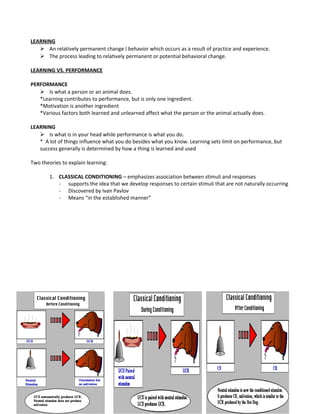
types of Learning
- 1. LEARNING An relatively permanent change I behavior which occurs as a result of practice and experience. The process leading to relatively permanent or potential behavioral change. LEARNING VS. PERFORMANCE PERFORMANCE Is what a person or an animal does. *Learning contributes to performance, but is only one ingredient. *Motivation is another ingredient *Various factors both learned and unlearned affect what the person or the animal actually does. LEARNING Is what is in your head while performance is what you do. * A lot of things influence what you do besides what you know. Learning sets limit on performance, but success generally is determined by how a thing is learned and used Two theories to explain learning: 1. CLASSICAL CONDITIONING – emphasizes association between stimuli and responses - supports the idea that we develop responses to certain stimuli that are not naturally occurring - Discovered by Ivan Pavlov - Means “in the established manner”
- 2. UCS-unconditioned stimulus CS- conditioned stimulus NS – neural stimulus UCR-unconditioned response CR- conditioned response The experiment consisted of presenting meat powder to the dog, then the ringing of the bell just before the dog’s tongue touched the eat powder. Pavlov noted that each time the meat powder was presented, salivation occurred. This time, the meat powder was presented. Only the bell was rung and each time the bell is ringing the dog salivated despite the presence of the meat powder. The transfer of response from one stimulus (meat powder) to another stimulus (ringing of the bell) is called conditioning. In classical conditioning, the organism learns to respond to a new stimulus in the same manner it responds to the old or previous unconditioned stimulus. OPERANT CONDITIONING – centers on association between responses and their consequences -In operant conditioning or instrumental learning, the learner is active, since the learner is active, since the learner is the one acting and discovering how his behavior affects the environment. -it is called operant because the learner has to operate using an instrument to be able to discover something in the environment. Skinner’s box (B.F. Skinner)
- 3. An experiment was conducted by B.F. Skinner on a hungry rat placed on a square box (Skinner’s Box) and a food pellet attached to a bar. Once the rat is placed inside the box, it goes around and touches various places of the box until it accidentally steps on the bar which releases the food pellet. The food pellet acts as a reinforcement to the pressing of the bar. Because of the food as a reinforcer (reward) the cat keep on pressing the bar, this time no longer accidental but intentional. A behavior of the rat has been conditioned. REINFORCEMENT- Refers to any stimulus that will mmaintain or increase the strength of a response. OTHER FORMS OF LEARNING: COGNITIVE LEARNING • Is a more complex form of learning, which involves interpreting present perceptions in the light of past information to get our way through unfamiliar problems. a. OBSERVATIONAL LEARNING • Is learning that occurs as a function of observing, retraining and in case of limitation, learning replication novel behavior executed by others.
- 4. • Learned through modeling (a mechanism that enables a person to learn complex social and cognitive behaviors by observations and imitation of others) b. INSIGHTFUL LEARNING • Involves sudden recognition of the nature of a problem and it’s correct or sudden-abrupt solution to it. • Discovering relationships that leads to the solution to a problem. • The moment of insightful earning comes when some form of perceptual reorganization occurs and effectively applies to new situation. c. Concept Learning - Are generalized symbolic responses to represent similar stimuli or stimulations. - Concept are in the mind of the learner . When these concepts are expressed out orally or in written form, they become terms. - Either abstract or concrete. THORNDIKE’S LAW OF LEARNING 1. The Law of Readiness -it states that when an organism is ready to act, action is satisfying and inaction is annoying. -when the organism is not ready to act, action is annoying, inaction is satisfying. 2. The Law of Exercise - The law says that exercise or practice reinforces learning. - E.g. drill, repetition, review, rehearsal 3. The Law of Effects - The law states that learning is strengthened if it gives satisfaction to the learer. It is weakened if it gives annoyance.
